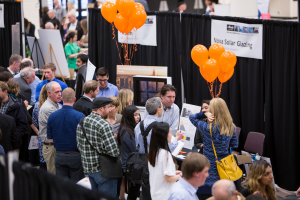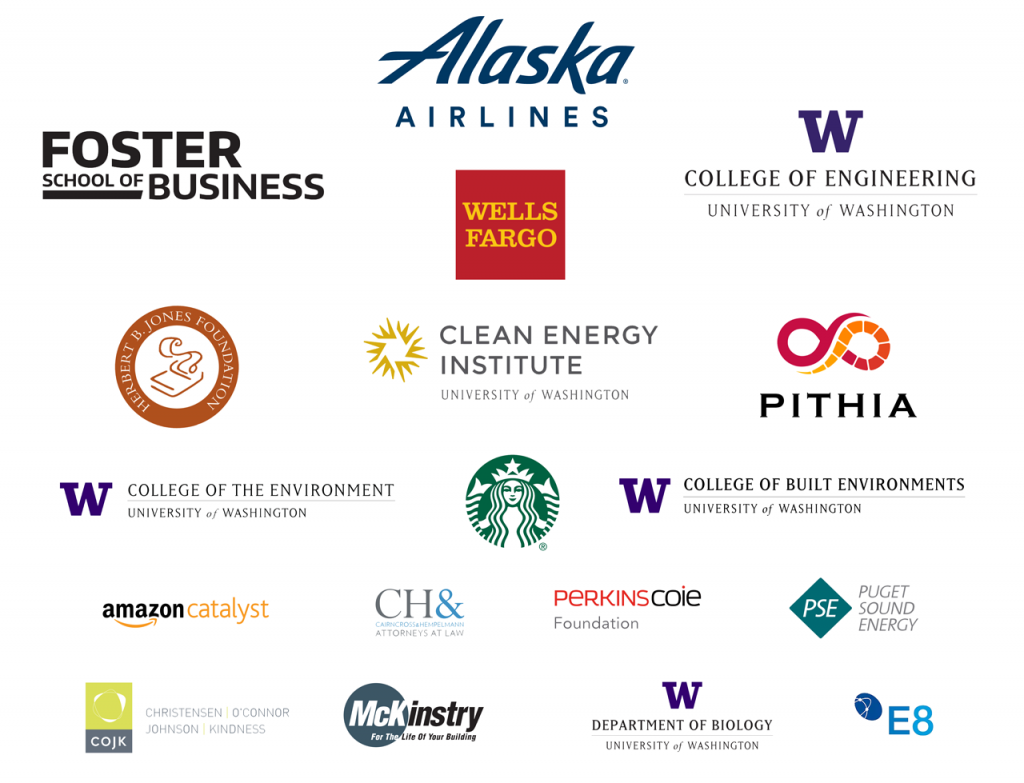Student Finalists Selected for Alaska Airlines Environmental Innovation Challenge
 The landmark 10th Anniversary of the Alaska Airlines Environmental Innovation Challenge couldn’t have come at a better time for college students around the Pacific Northwest. Twenty-three teams will compete on March 29 for up to $15,000 in prizes at the competition, hosted by the UW Foster School’s Buerk Center for Entrepreneurship. Beyond the awards lies tremendous possibility for their innovations, prototypes, and ideas to enter a space that is expanding rapidly. The World Economic Forum reports “eco-innovative companies of all sizes are growing, on average, at a rate of 15 per cent a year, at a time when their respective markets have remained flat.”
The landmark 10th Anniversary of the Alaska Airlines Environmental Innovation Challenge couldn’t have come at a better time for college students around the Pacific Northwest. Twenty-three teams will compete on March 29 for up to $15,000 in prizes at the competition, hosted by the UW Foster School’s Buerk Center for Entrepreneurship. Beyond the awards lies tremendous possibility for their innovations, prototypes, and ideas to enter a space that is expanding rapidly. The World Economic Forum reports “eco-innovative companies of all sizes are growing, on average, at a rate of 15 per cent a year, at a time when their respective markets have remained flat.”
Each team (detailed below) will receive significant feedback and advice at the event by more than 140 cleantech entrepreneurs, investors, and environmental leaders from across the region. The 23 teams were screened by a select group of judges from a pool of applicants representing six universities in Washington, Oregon, and Idaho. In total, 93 students (39 graduates and 54 undergraduates) will compete. The UW teams alone represent more than a dozen colleges/schools and departments across the Seattle campus. Three teams also feature students from the first-ever cohort of the Master of Science in Entrepreneurship program, which began June 2017.
Good luck to the 2018 Alaska Airlines Environmental Innovation Challenge finalists:
4th-Phase
4th-Phase harnesses the power of nature by leveraging its patented breakthrough water technology to boost plant yields, up to 50%, in a safe and natural way.
- University of Washington (MBA, Business, Bioengineering, and Materials Science & Engineering)
AeroSpec
AeroSpec uses a real-time data monitoring and analysis sensor to inform users about the air they breathe with the goal of vastly reducing the rates of illness related to particulate exposure.
- University of Washington (Business)
Astrolabe Analytics
We build analytics software to help engineers at small- and medium-sized battery companies spend less time in Excel and more time innovating.
- University of Washington (Materials Science & Engineering)
Battery Informatics, Inc.
Battery Informatics, Inc. (Bii) uses valuation algorithms to give customers insight into how to increase the life and performance of their energy storage projects involving lithium-ion batteries.
- University of Washington (Business, Chemical Engineering)
BeeToxx
A carbon-based microparticle solution that protects Honey Bee colonies exposed to harmful pesticides.
- Washington State University (Communication, Bioengineering, Entrepreneurship, and Biology)
BioPots
Production of higher-value molded paper products (biodegradable planter pots) out of biomass waste (recycled pulp fiber and spent beer grain) to displace their non-renewable counterpart (disposable plastic pots).
- University of Washington (Bioresource Science and Engineering, Business)
DAWGMA
We are developing strains of transgenic yeast capable of sensing waterborne pollutants and glowing in response.
- University of Washington (Microbiology, Biology, Bioengineering, and Business)
DermaDot
Non-invasive, simple, mobile skin reaction detection that facilitates the selection of safer and more environmentally-friendly products.
- University of Washington (Chemical Engineering)
Feros Freight Innovations
Feros is transforming the role of freight trailers from a box on wheels to a value-creation asset that seamlessly integrates EV technologies into the trucking system and enables companies to transport freight cheaper, faster, and cleaner.
- University of Oregon (MBA Finance, MBA Sustainable Business, MBA Entrepeneurship and Mechanical Engineering)
Hasiru Mane
We are a consulting firm committed to integrating upcycled materials into the housing sector. We link a market of underserved low-income households to unconventional materials to provide low-cost sustainable building solutions.
- University of Washington (Civil and Environmental Engineering and Environmental Studies)
Incite Water
Incite Water is creating an online marketplace that will allow corporations to trade water savings while spurring homeowner adoption of water saving technologies.
- University of Washington (Business, Human Computer Interaction and Design, Data Science, Economics, Biology, and Atmospheric Science)
Kau Bell Vodka
Kau Bell Vodka is a sustainable spirit company that produces a superior tasting product by repurposing excess whey from the dairy industry.
- University of Oregon (MBA and Planning, Public Policy & Management)
Lonely Produce
Lonely Produce finds a home for end of day farmers market goods that would otherwise go to waste.
- University of Washington (Master of Science in Entrepreneurship)
Organic Goo
A sustainabile sunscreen product aimed at saving the oceans and coral reefs from the chemical pollutants that currently exist in many existing sunscreen products.
- University of Washington (Neurobiology and Master of Science in Entrepreneurship)
Otogear Inc.
OTOGEAR is a patent pending earplug attachment that helps decrease hearing protection waste, while increasing hearing protection usage visibility to prevent unnecessary ear infections.
- University of Washington (MBA and Master of Science in Entrepreneurship)
Quikpool
Quikpool is an app that strives to better carpooling experiences by making it more convenient, safer, and reliable.
- University of Washington (Computer Science, Economics, and Mechanical Engineering)
Simplice
Re-purposing of by-product from Greek yogurt industry to reduce water footprint of the dairy industry and increase food sustainability.
- Washington State University (Marketing and Communication)
SoLiModule
SoLiModule is a solar/Lithium-ion battery module for off-grid systems for immediate response in emergencies, remote areas, and military applications.
- University of Washington (Chemical Engineering)
Tellos Sensors
Reducing agricultural over-irrigation by 10-25% by providing a wireless, battery-less solution to large area moisture sensing at a fraction of the cost of other sensors.
- Oregon State University / University of Washington (Computer Science, Electrical Engineering, Mechanical Engineering, and Business)
Trash to Treasure (T2)
High cost of bioproducts production and valorization of waste streams have been identified as two key barriers, and this project overcomes these barriers by developing a hybrid bio-refinery platform to transform the negative-value waste materials into high-value biodegradable biopolymers.
- Washington State University (Biological Systems Engineering, Mechanical and Materials Engineering, and Food Sciences)
UW Hyperloop
The UW Hyperloop team is a diverse set of students who have come together in the pursuit of designing, building, and implementing the Hyperloop, a sustainable form of public transportation that will cut travel times, congestion in cities, and greenhouse gas emissions.
- University of Washington (Mechanical Engineering, Business)
WELLNESS
Our project focuses on borewell quality and quantity monitoring in Bangalore, India using a low-cost monitoring device and database platform that would address the scarcity of publicly available information surrounding the aquifers beneath the city.
- University of Washington (Bioengineering, Civil and Environmental Engineering, Environmental and Occupational Health Sciences, and Civil Engineering)
WOLF Solutions
Our project advances the zero-waste to landfill initiative by putting dog waste back into the Earth’s system with our automated composting unit, reducing the more than 7.2 million tons of dog waste bagged in plastic and sent to landfills every year.
- Presidio Graduate School-Seattle (MBA Sustainable Systems)
And a special thank you to all of the sponsors of this year’s competition:

